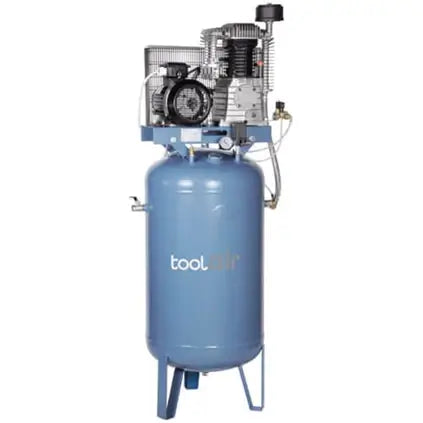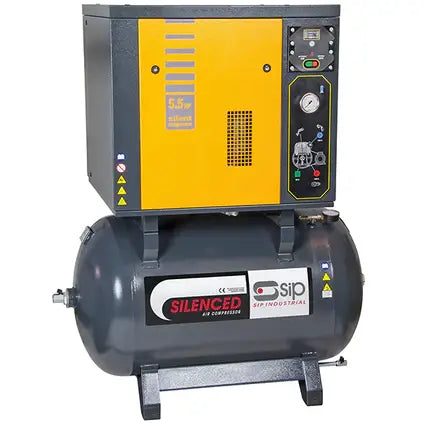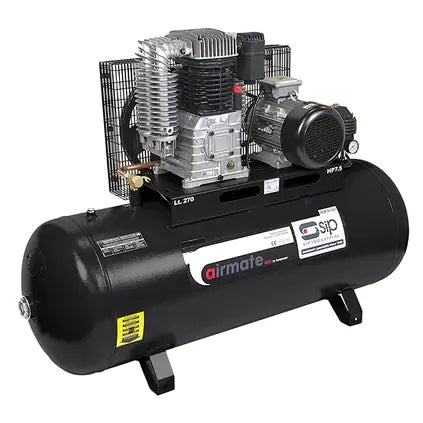
Continuous Operation of Air Compressors – FAQ
Welcome to our comprehensive guide on the continuous operation of air compressors. If you've ever wondered whether air compressors can run continuously for your industrial or DIY needs, you've come to the right place. In this article, we will address frequently asked questions and provide valuable insights on this topic.

Key Takeaways:
- Air compressors can run continuously depending on their design, motor capacity, and maintenance practices.
- Factors such as motor type, cooling mechanisms, and lubrication are crucial for extended operation.
- Regular servicing and effective heat dissipation are essential to ensure optimal performance and longevity.
- Choose air compressors specifically designed for continuous use if you require continuous operation.
- Follow manufacturer guidelines and recommendations to maximize the lifespan of your air compressor.
Operating Air Compressors Continuously
When it comes to the continuous running of air compressors, there are several factors to consider to ensure optimal performance and longevity. Whether you need an air compressor for industrial purposes or DIY projects, understanding the implications of running it non-stop is crucial.
Motor Type: The type of motor used in an air compressor plays a significant role in its ability to run continuously. Some motors are designed for continuous duty, meaning they can operate without overheating or experiencing premature wear. It is essential to check the specifications of the compressor's motor and ensure it is suitable for long hours of operation.
Cooling Mechanisms: Continuous running of air compressors generates a significant amount of heat. Adequate cooling mechanisms are crucial to prevent overheating and maintain efficient performance. Compressors equipped with cooling fans or air cooling systems are preferable for continuous operation as they dissipate heat effectively and keep the internal components at optimal temperature.
Maintenance Requirements: To ensure smooth operation and minimize the risk of breakdown, regular maintenance is essential for air compressors running non-stop. This includes proper lubrication of moving parts, monitoring and adjusting the pressure settings, and keeping the intake filters clean. Regular servicing by a qualified technician is recommended to address any potential issues and keep the compressor in top shape.
By considering these factors and following the manufacturer's guidelines, an air compressor can run constantly, meeting the demands of various applications. However, it is important to note that even compressors designed for continuous use may benefit from occasional breaks to prevent excessive wear and tear.

Keeping Air Compressors Running Constantly
When it comes to air compressor continuous use, proper maintenance and care are vital for ensuring optimal performance and longevity. Operating an air compressor continuously requires attention to certain key factors to avoid unnecessary wear and tear. In this section, we will provide practical tips on how to keep air compressors running constantly, allowing you to meet your industrial or DIY needs without interruption.
Lubrication
Regular lubrication is essential for the smooth operation of an air compressor during continuous use. Lubricating the moving parts minimizes friction and heat buildup, preventing premature wear and extending the lifespan of the equipment. Check the manufacturer's recommendations for the type of lubricant and the frequency of lubrication. Make sure to use high-quality lubricants suitable for your specific air compressor model.
Regular Servicing
Performing regular servicing and inspections is crucial for maintaining the optimal functioning of an air compressor. Regularly check and clean the intake filters to prevent dust and debris from entering the system. Keeping the filters clean ensures proper airflow and prevents potential damage to the compressor. Additionally, inspect all hoses, connections, and fittings regularly to identify any signs of leaks or wear. Promptly repair or replace any damaged components to prevent further issues.
Effective Heat Dissipation
Heat dissipation is a critical aspect of keeping air compressors running constantly. Excessive heat can lead to reduced efficiency and potential damage to the compressor. Ensure proper ventilation around the compressor by positioning it in a well-ventilated area with adequate airflow. Avoid placing the compressor near heat sources or in confined spaces. Regularly clean the cooling fins and ensure that the air intake and exhaust ports are clear of any obstructions.
Proper Shutdown Procedures
When it's time to shut down the air compressor after continuous use, follow proper shutdown procedures. Allow the compressor to run without load for a few minutes to cool down before turning it off. This helps prevent any residual heat from causing damage. Additionally, make sure to drain any accumulated condensation from the receiver tank to prevent corrosion and maintain the integrity of the air compressor system.
| Tips for Keeping Air Compressors Running Constantly |
|---|
| Regularly lubricate the moving parts |
| Inspect and clean intake filters |
| Check hoses, connections, and fittings for leaks |
| Ensure proper heat dissipation with adequate ventilation |
| Follow proper shutdown procedures |

Conclusion
In conclusion, we have explored the topic of continuous operation of air compressors. For those in need of extended air compressor use, it is crucial to consider various factors to ensure optimal performance and longevity.
Firstly, it is important to assess the motor capacity of the air compressor. Ensure that the motor is suitable for continuous operation without overheating or experiencing performance issues. Additionally, it is advisable to choose air compressors with efficient cooling systems in place, such as built-in cooling fans or external cooling mechanisms, to dissipate heat effectively.
Maintenance practices also play a vital role in the continuous operation of air compressors. Regular lubrication of moving parts and scheduled servicing can prevent excessive wear and tear, ensuring smooth functioning over an extended period. By following manufacturers' guidelines and recommendations, air compressors can be kept in excellent condition, reducing the risk of breakdowns and maximizing their lifespan.
To summarize, while some air compressors are designed for continuous use, it is essential to consider aspects like motor capacity, cooling systems, and maintenance practices. By adhering to these guidelines, users can rely on air compressors to meet their industrial or DIY requirements effectively, ensuring hassle-free and uninterrupted operation.

